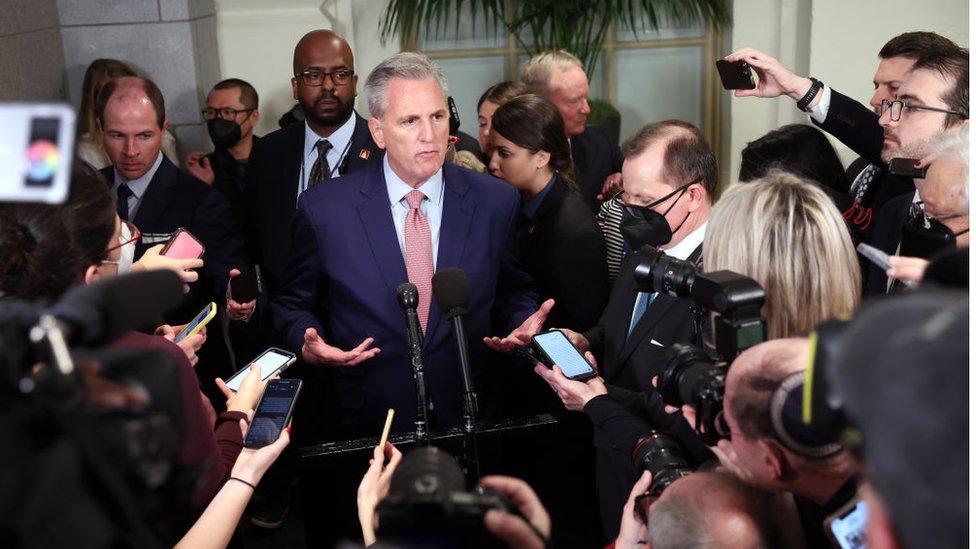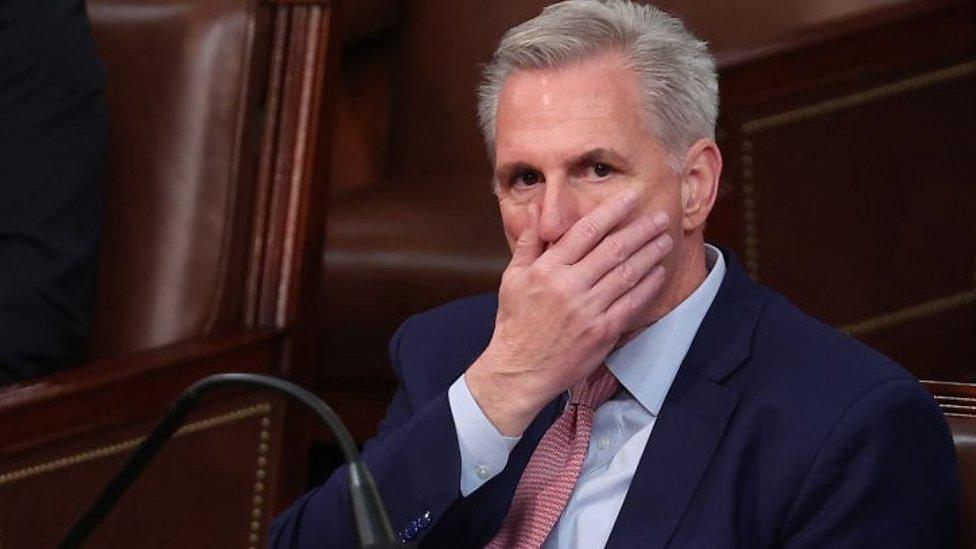It's not over for Kevin McCarthy's House Speaker bid - here's why
- Published

Republican Kevin McCarthy has lost three rounds of voting to become the next Speaker of the House of Representatives, the first time a nominee has been defeated in a century.
The House has now adjourned and will vote again on Wednesday.
The historic losses do not immediately end Mr McCarthy's candidacy.
But it is unclear how he can convince 20 Republican rebels to back him.
There are only 222 Republicans in the chamber this year so the representative from California could only afford to lose four votes from his party. In each of the first two rounds he secured only 203 votes - and in the third round an extra Republican turned against him.
"We stay in until we win," a defiant Mr McCarthy told reporters earlier in the day, insisting by nightfall that he would still become Speaker if he kept talking to his members and solved their "small problems".
All 212 Democrats voted for their party leader, Representative Hakeem Jeffries of New York.
What comes next?
The House will keep voting for Speaker until a candidate is elected - but after more than five hours of speeches and voting, members agreed to try again tomorrow.
The chamber cannot proceed with any other business until they have chosen a Speaker. That includes swearing in new members of Congress, and adopting new rules and legislations.
It's not yet clear how many rounds of balloting it will take for members to decide the contest. The process could continue for days if no consensus is reached.
The last time a candidate for speaker failed to secure the necessary votes on the first round of ballots occurred in 1923. It took nine ballots and several days to select a Speaker.
Why is McCarthy facing opposition?
Past speakers have faced obstacles coming into a new Congress, but have managed to rally their caucus behind them by the time the official vote arrived. But Mr McCarthy has faced opposition from hard-right members of his own party ever since Republicans secured control of the House in last November's midterm elections.
The holdouts oppose his speakership on ideological and personal grounds, and have spent weeks negotiating Mr McCarthy to win concessions, such as changes to a procedure to oust a sitting speaker.
The pack is led by Representative Andy Biggs of Arizona, who has put himself forward as an alternative if long-shot candidate, and Representative Matt Gaetz of Florida, who spent much of the last Congress under the spectre of a federal investigation. Mr Biggs received 10 votes in the first round, while nine Republicans backed other candidates.
In the second round, the 19 Republicans rallied behind Jim Jordan of Ohio; in a strange twist, Mr Jordan had himself nominated Mr McCarthy. In the third round, Mr Jordan's tally actually increased to 20 raising the question.
Summing up the frustration with Mr McCarthy, popular right-wing cable news personality Tucker Carlson said: "McCarthy is not especially conservative. He's ideologically agnostic. His real constituency is the lobbying community in Washington. If you've got sincere political beliefs, that's infuriating."
Related topics
- Published4 January 2023
